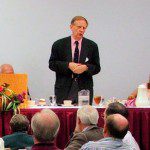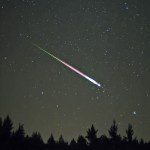
On the flight from Honolulu to Sydney, I watched the 2015 film In the Heart of the Sea, about the disastrous final voyage of the Nantucket whaling ship Essex, which served as the inspiration for Herman Melville’s great novel Moby Dick. The movie was a box office bomb. I honestly don’t know why that would be so; I enjoyed it very much (if enjoy is really the right word to use for such a horrifying tale).
I also read most of Deborah Blum’s 2007 book
I share a couple of passages from it:
In his most famous demonstration—investigated by German philosopher Immanuel Kant—Swedenborg disrupted a garden party by suddenly announcing a firestorm in Stockholm, some three hundred miles away. Staring at a clear evening sky, Swedenborg described the fire’s progress, street by street and building by building, to the disbelieving company. Two days later, a messenger from Stockholm confirmed every detail. Kant concluded that the case showed “beyond all possibility of doubt” that Swedenborg did indeed possess an extraordinary visionary gift. (23)
Surprisingly, in view of his well-known skepticism about religion — in fact, cynicism might be the better word for it — Mark Twain (Samuel Clemens) was strongly inclined to believe in what we would call extrasensory perception (ESP) or telepathy (clairvoyance). He was an enthusiastic early member of the American Society for Psychical Research. Here, in Deborah Blum’s retelling is the experience that launched his interest. It apparently troubled him for the rest of his life:
In 1858 the Clemens brothers, Sam and Henry, were training to be riverboat captains, working the Mississippi River together on a big, steam-powered paddle-wheeler called the Pennsylvania. On an early June evening, the boat docked in Saint Louis, and the brothers went ashore to visit their sister. After dinner, Henry went back to the Pennsylvania. Sam stayed the night at his sister’s house.Just as Sam Clemens started to slide into sleep, an image formed, a horrifyingly detailed dream in which he saw his younger brother’s body tucked into a casket. The coffin lay balanced across two chairs. Flowers sprayed across Henry’s unmoving chest, a cascade of white roses with a single red bloom in their center.Samuel Clemens sat up in bed, gasping, his heart pounding. He stumbled downstairs, half awake, the dream still so real that he was braced against the sight of his brother’s body in the parlor. He’d been almost shocked to find the parlor quiet and dark, its chairs empty of dead men, its air unscented by roses.Just a dream, he told himself, just a dream.When Sam returned to the Pennsylvania that morning, his brother was waiting—whole, healthy, a little sleepy in the morning light. But they were separated again; the captain transferred Sam over to help on a companion boat, one that trailed behind by a day. Three days later, the Pennsylvania’s boiler exploded, just as the boat cruised south of Memphis. One hundred and fifty people were killed or injured. As soon as the news reached him, Sam Clemens left his boat, hired a fast horse, and rushed to Memphis, where survivors were filling the local hospital.Henry Clemens died that night with his brother sitting beside him. In the morning, Sam walked numbly down to a room where the bodies of the dead were awaiting burial. Henry lay in a metal casket, balanced across two chairs.As Sam Clemens stood, blinking against the memory of his dream, a volunteer nurse stepped up to the coffin and gently laid across it a bouquet of white roses with a single red bloom in their midst. (103-104)

For the 28 January 2024 episode of the Interpreter Radio Show, Steve Densley, Kevin Christensen, and John Thompson discussed two recent articles in Interpreter: A Journal of Latter-day Saint Faith and Scholarship and Come, Follow Me Book of Mormon lesson 8.
A recording of their conversation has now been edited to remove commercial breaks, archived, and made available for your listening pleasure. (The “New Testament in Context” portion of this show, for the Come, Follow Me Book of Mormon lesson 8, will also be posted separately on Tuesday, 13 February 2024.
The weekly Interpreter Radio Show can be heard on Sunday evenings from 7 to 9 PM (MDT), on K-TALK, AM 1640. But only, reliably, in the Valley of the Great Salt Lake. Happily, though, you can also listen live on the Internet at ktalkmedia.com from wherever you happen to be.

Please note, once again, the heavenly reunions depicted in the mural on the wall. Such reunions are, yes, part of my joyous expectation for the life to come.
An anonymous critic, an atheist, mocks me because, he says, my notion of eternal joy consists of traveling and having lunch with friends. And he’s partially correct. An important component of eternal joy, from my point of view, will indeed be experiencing beautiful and interesting places and enjoying perfect fellowship with an ever-widening circle of other souls.
When the Savior shall appear we shall see him as he is. We shall see that he is a man like ourselves. And that same sociality which exists among us here will exist among us there, only it will be coupled with eternal glory, which glory we do not now enjoy. (Doctrine and Covenants 130:1-2)
My belief is that all of us, or almost all of us, will ultimately receive more or less what we earnestly desire. Those who find their joy in anonymously carping at others will have a place, too. (I would consider it Hell.) Provision will be made for all. It’s a manifestation, I expect, of what is sometimes called the “principle of plenitude.”
Posted from Sydney, New South Wales, Australia













